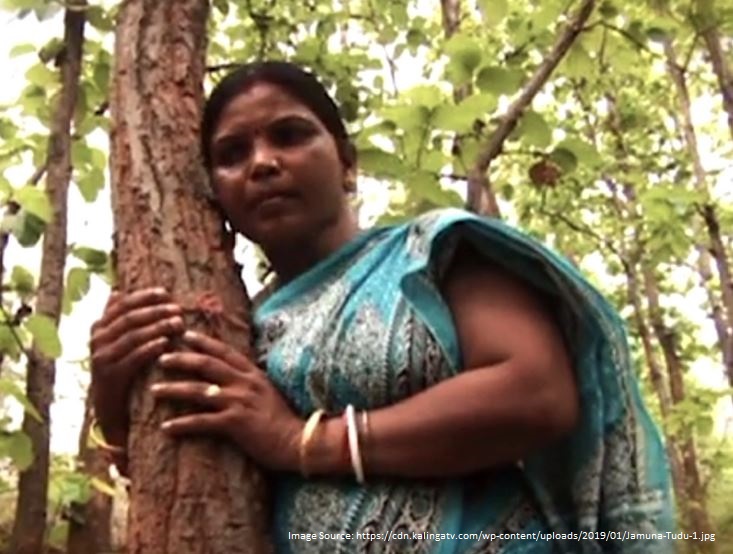Jamuna Tudu: A Tale of Feminist Environmentalism

Kartika Puri, an undergraduate student at Ashoka University, explores writerly migrations between the spheres of art, society, and politics.
Jamuna Tudu: A Tale of Feminist Environmentalism
In India, 24.39 per cent of the geographical terrain is forestland. Innumerous Adivasi people are directly sustained by it. To them, forests tender fuelwood, forage, water, and dwelling. Yet, for them, this terrain is not solely a source of sustenance. Rather, the forest-dwellers have an intimate relationship with it.
Commonly, women undertake domiciliary chores. They, then, frequent the forestland more. In consequence, they are more acquainted with it. Thus, the Adivasi women have a unique symbiotic relationship with their environment. For example, Jamuna Tudu resides in Mathurgham-Chakulia, Jharkhand. Of forests, she says, “I was reared in the jungle and the love for the trees and plants grew naturally within me. I love every tree as my own child”. Hence, the Adivasi people make certain to fulfil their sustenance requirements sustainably. “We don’t cut trees on purpose…and use the fallen trees and branches for all our needs, the amount we are able to save up during the rains is sufficient for the whole year.”
In Indian history, Adivasi people have been treated unjustly. They were disenfranchised by feudal states. Then, from the forests, they were expropriated by the British. Subsequently, the self-legislating Indian government sequestrated most of their dwelling. At present, as an indemnity for this historical injustice, some forestland is secured solely for their use. However, timber mafias subject this land to unlawful logging. For example, in 1998, a few days following her marriage, Tudu had accompanied her mother-in-law to gather fuelwood. While gathering it, she first sighted the mafia cutting trees. Immediately, Tudu was saddened; she was panic-struck. “I felt that if we keep cutting the trees this way, all our forests will be wiped out…How will we protect the environment if the forest is destroyed?” Thus, she wished to halt their activity.
However, for their unlawful logging, mafias often collude with forestry officials, local politicians, businesses, and, at times, the male citizenry. It was futile for Tudu to, then, appeal to them. Instead, she initiated a discussion with the women of her village. “I held a meeting with them several times”. At first, the other women were apprehensive. They said, “We won’t do it, this will require us to fight the men in the village”. Nevertheless, owing to their symbiotic relationship with the forestland, before long, they assented to Tudu’s wish. She had marshalled a group of twenty-five women. This became the Van Suraksha Samiti (Forest Protection Committee).
At present, the Van Suraksha Samiti has sixty members. They frequently rally against the mafias. The women are equipped with spears and arrow. Each day, they patrol the forestland thrice. In consequence, across three hundred villages, they have conserved fifty acres of it.
And inspired by Tudu, (nicknamed Lady Tarzan) in Mathurgham-Chakulia, they now plant eighteen trees when a girl is born, ten when she weds.
Sources
http://fsi.nic.in/forest-report-2017
http://www.vikalpsangam.org/article/how-a-few-women-saved-a-forest-from-timber-mafia/#.XPoFdFwzZPY
Opinions expressed are of the writer.

